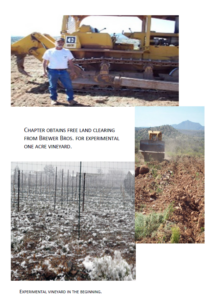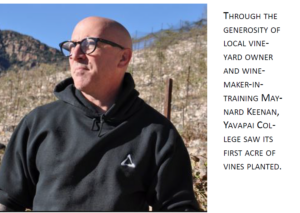OUTGOING GOVERNING BOARD MEMBER KUKNYO CLAIMS 25% OF ATHLETES ARE LOCAL, BUT DATA SUGGEST OTHERWISE
YAVAPAI COMMUNITY COLLEGE DECEMBER GRADUATION CEREMONIES SET FOR NARTA AND NURSING PROGRAM
Thursday, December 12 at 11 a.m. for NARTA and Friday, December 13 at 1 p.m. for Nursing Pinning Ceremony at Jim and Linda Lee Performing Arts Center on the Prescott Campus
 Yavapai Community College will hold graduation ceremonies for students in the NARTA and Nursing programs in December. The Northern Arizona Regional Training Academy (NARTA) Graduation is scheduled for 11 a.m. and will be held at the Jim and Linda Lee Performing Arts Center on the Prescott Campus. The Nursing Pinning ceremony will be held December 13 at the Center beginning at 1 p.m.
Yavapai Community College will hold graduation ceremonies for students in the NARTA and Nursing programs in December. The Northern Arizona Regional Training Academy (NARTA) Graduation is scheduled for 11 a.m. and will be held at the Jim and Linda Lee Performing Arts Center on the Prescott Campus. The Nursing Pinning ceremony will be held December 13 at the Center beginning at 1 p.m.
The Community College described the NARTA graduation as a ceremony celebrating the completion of training programs for law enforcement officers in Northern Arizona. NARTA provides specialized training for new recruits and current officers to enhance their skills and knowledge in various aspects of law enforcement.
During the graduation ceremony, participants who have successfully completed their training programs are formally recognized and awarded certificates or badges. The event typically includes speeches from key figures in law enforcement, presentations of awards, and sometimes demonstrations of skills learned during training.
 The Community College describes the nursing pinning ceremony as a symbolic event that marks the transition of nursing students from their academic training to becoming registered nurses. It typically takes place near the end of their nursing program and is a rite of passage that celebrates their hard work and dedication.
The Community College describes the nursing pinning ceremony as a symbolic event that marks the transition of nursing students from their academic training to becoming registered nurses. It typically takes place near the end of their nursing program and is a rite of passage that celebrates their hard work and dedication.
During the ceremony, each graduate is presented with a nursing pin, often by a family member or mentor, which represents their accomplishment and entry into the nursing profession. The pin usually features the insignia of the nursing school or organization and sometimes includes symbols related to nursing, like a lamp or a caduceus.
The ceremony often includes speeches, the recitation of the Nightingale Pledge (a commitment to ethical practice), and sometimes the presentation of awards. It’s a meaningful tradition that honors the students’ achievements and their commitment to caring for others.
VERDE VALLEY CAMPUS WINE AND DINE IN THE VINES EVENT RAISES OVER $50,000
Second straight year event eclipses $50,000 | Third District Governing Board representative Toby Payne gave final report at November Governing Board meeting

Discussing and purchasing wine at the program celebrating the vineyard and viticulture program back in 2010.
Yavapai Community College Third District Representative Toby Payne presented the final report on the 14th annual Verde Valley Campus fundraiser celebrating the viticulture and enology program and creation of a vineyard and center to support it (for last ten years the event has been called Wine & Dine in the Vines). The report was made during the District Governing Boards’ November meeting. The event, held Saturday, October 19, 2024, successfully raised over $50,000, matching the amount raised in 2023.

The late Yavapai Community College president Dr. James Horton, a visionary, attending the 2010 event celebrating the start of the experimental vineyard on the Verde Valley Campus.
Proceeds from the event will fund student activities and scholarships while supporting the priority needs of the College’s Viticulture and Enology program, which has become a cornerstone of the College’s Verde Valley presence. Thirteen wineries, six of them Southwest Wine Center Alums, and nine restaurants participated. There were approximately twenty sponsors. Over 200 guests were served.
History:
The Greater Verde Valley Chapter of the Yavapai Community College early on recognized the potential economic value to the Community College and the Community of involving itself in the fledgling wine industry in the Valley. It took a first step when it became a member of the Greater Verde
Valley Wine Consortium during the 2008-09 academic year.

Thanks to the decision by then Yavapai Community College president Dr. James Horton, in 2010 an experimental one acre of grape vines was planted on the Verde Valley Campus. Dr. Horton had discussed the matter with local rockstar and entrepreneur Maynard Keenan. Mr. Keenan generously provided financial support for plants and materials for the experimental vineyard.
Community College and part-time Greater Verde Valley Chapter of the College Foundation employee Linda Buchanan persuaded a local excavation company, the Brewer Brothers to help out with first project. They agreed to prepare the ground for the first one acre vineyard—a big job and all for free.
Yavapai Professor Tom Schumacher drafted a detailed 16 page plan for what is now the Viticulture and Enology program. President Horton instructed Professor Schumacher to move forward with research into creating this new program. 
Once the first experimental acre was leveled, Ms. Nikki Check (now Third District County Supervisor) and others dug the holes for the soils testing and trenches for the water lines so that the vines could be planted.
It is noteworthy that during this period, Robert Oliphant, then a member of the Community College Foundation Board, worked closely with Board members to expand the viticulture program from one experimental acre to 20 acres of particularly rich land immediately adjacent the Campus.
The initial plan for the large Campus vineyard was the vision of a Cottonwood group consisting of Oliphant, Ms. Ruth Wicks, Mr. Randy Garrison, Professor Tom Schumacher, and Professor Paula Woolsey. They met during 2009-2010 and prepared a detailed financial plan that Oliphant presented to the Community College Foundation Board. This plan provided the basis for the donation of the rich 20 acres adjacent the Campus that is now used in part (only 13 acres) for the vineyard.
The Wine & Dine in the Vines fundraiser can trace its genesis to at least 2010, when an event called French Flair in the Countryside was held to celebrate the establishment of the one acre experimental vineyard on the Verde Campus. The event was created by the Greater Verde Valley Chapter of the Yavapai Community College Foundation, which was later dissolved by former Yavapai Community College President Dr. Penelope Wills.
The 2010 theme remained until 2012 when it became “Art, Wine and Dine.” The Southwest Wine Center Board ensured the event’s continuation and labeled it “Wine & Dine in the Vines” ten years ago. Over the years, the fundraiser has grown into a highly successful and eagerly anticipated community tradition in the Sedona/Verde Valley area.
You may listen to Third District Toby Payne’s full report to the Governing Board by clicking on the video below (For reasons unclear, the video operator did not put Mr. Payne in the video frame during most of the report.)
YAVAPAI COMMUNITY COLLEGE’S PRESCOTT CAMPUS JIM & LINDA LEE PERFORMING ARTS CENTER UNVEILS FESTIVE DECEMBER LINEUP
Outstanding month-long holiday events include concerts by the Community College’s combined choirs and festival orchestra, the Prescott Pops orchestra, and the national and international talent of Mark O’Connor’s Appalachian Christmas, and the Irish Tenors
Yavapai Community College’s Jim & Linda Lee Performing Arts Center on the Prescott Campus presents a splendid and diverse lineup of programs for the December holiday season. This year’s offerings include captivating concerts by the College’s combined choirs and festival orchestra, as well as the beloved Prescott Pops Orchestra. Adding to the festive spirit are spectacular performances by nationally and internationally acclaimed artists, including Mark O’Connor’s Appalachian Christmas and the iconic Irish Tenors.
These programs align with the Community College’s cultural mission for the County. They are expected to draw over a thousand attendees per event to the Performing Arts Center throughout December.
While open to the entire community, the live programs primarily benefit residents of the Prescott and Prescott Valley areas due to several challenges. The challenges include the vast size of Yavapai County—comparable to the size of Israel—combined with limited county-wide transportation, restricted road access, and unique geographical barriers. These present significant obstacles for residents on the east side of the county to easily attend any of the programs.
Despite decades of awareness, the College has struggled to extend similar cultural opportunities to communities in Sedona, the Verde Valley, and other semi-rural or rural areas, leaving these regions underserved. Addressing these disparities remains an ongoing challenge for the institution.


YAVAPAI COMMUNITY COLLEGE TO HOST CERAMICS SALE ON VERDE VALLEY CAMPUS DEC 14 FROM NOON TO 3:30 P.M.
Sale to be held at the Southwest Wine Center, Building 601, Clarkdale Campus
Yavapai Community College invites the community to a ceramics sale on Thursday, December 14, from noon to 3:30 p.m., at the Verde Valley Campus in Clarkdale. This event offers a chance to purchase unique, handcrafted treasures created by the College’s talented students and faculty—perfect for holiday gifts.
While you shop, enjoy a glass or share a bottle of the College’s student-crafted wine, adding a special touch to your experience.

PRESIDENT RHINE REVEALS CHILLING DIRECTIVE: ALL FACULTY AND STAFF FORBIDDEN FROM DISCUSSING COLLEGE OR COMMUNITY MATTERS WITH SERVING DISTRICT GOVERNING BOARD MEMBERS UNDER THREAT OF DISCIPLINE FOR EVEN POTENTIALLY INNOCENT MINOR VIOLATIONS
This seems to reflect a typical authoritarian perspective, marked by a profound distrust in the integrity of Governing Board members and the imposition of a free speech barrier throughout its campuses and centers
 It may have shocked some to learn that Yavapai Community College President Dr. Lisa Rhine has issued a chilling directive to staff, instructing them to never discuss college or community matters with a member of the District Governing Board. According to Dr. Rhine, even an innocent conversation with a Board member could lead to disciplinary action if it touches on something she considers and defines as “college operations.”
It may have shocked some to learn that Yavapai Community College President Dr. Lisa Rhine has issued a chilling directive to staff, instructing them to never discuss college or community matters with a member of the District Governing Board. According to Dr. Rhine, even an innocent conversation with a Board member could lead to disciplinary action if it touches on something she considers and defines as “college operations.”
Dr. Rhine revealed this authoritarian edict while supporting a provision in a District Governing Board policy resolution drafted by former college president and consultant Dr. David Borofsky. The resolution, which was under discussion, included a clause that was eventually approved in a 4-1 vote. The provision states: “Under no circumstances should an individual Board member direct or contact by any means, a staff member concerning a college or community issue.”
This poorly drafted provision effectively limits a Board member’s ability to seek information from any college source other than the president. The restriction, in the Blog’s view, clearly undermines the role of Board members, who are elected officials entrusted with representing the taxpayers of Yavapai County. It also reflects a profound distrust of the integrity of Board members.
Below is a video clip of Dr. Rhine’s comments, delivered to the Board at its November 21 meeting on the Prescott Campus.
LAME DUCK YAVAPAI COMMUNITY COLLEGE DISTRICT GOVERNING BOARD APPROVES 4-1 DRACONIAN RESOLUTION DESIGNED TO THROTTLE ELECTED BOARD MEMBERS FREE SPEECH AND CEMENT PRESIDENT’S POWER
Drafted by a former College president and current consultant, the document contains extreme provisions solely intended to allow the Community College president to control an elected Governing Board member’s behavior and speech when it comes to the taxpayer supported institution
 OPINION: The outgoing Yavapai Community College District Governing Board, with two lame-duck members, convened on November 21 at the Prescott Campus, where one of the major issues was a controversial resolution drafted by current consultant and former college president Dr. David Borofsky. The resolution’s main purpose appears aimed at stifling and controlling the free speech and behavior toward faculty and staff of elected Board members. As written, the resolution raises serious concerns about transparency and accountability.
OPINION: The outgoing Yavapai Community College District Governing Board, with two lame-duck members, convened on November 21 at the Prescott Campus, where one of the major issues was a controversial resolution drafted by current consultant and former college president Dr. David Borofsky. The resolution’s main purpose appears aimed at stifling and controlling the free speech and behavior toward faculty and staff of elected Board members. As written, the resolution raises serious concerns about transparency and accountability.
Dr. Borofsky’s professional history is deeply intertwined with Yavapai Community College leadership. He previously served as Interim Executive Director of the Arizona Association of Community College Trustees (AACCT), an organization that listed Yavapai Community College Board Chair Deb McCasland among its members. He is now the permanent Executive Director of a separate entity, the Arizona Community College Coordinating Council (ACCCC), which lists as a member Yavapai Community College President Dr. Lisa Rhine.
Notably, Borofsky’s tenure as a college leader has not been without controversy. For example, it was reported that at Dakota State University he unexpectedly resigned when students began organizing petitions “to then President Borofsky—who was primarily suspected for pressuring the changes in leadership—asking for answers to why these decisions were made.” The claim was that “several high profile administrators” had stepped down, and it “was believed by many students and faculty that these administrators had not stepped down willingly.”
It was also reported that Jack Warner, executive director of the Board of Regents, “managed to confirm a suspicion that students . . .held since the incident: Doctor Borofsky’s choice to leave was a quick development, and was certainly made because of the poorly received decisions.”
At the November Yavapai Community College Governing Board meeting, Third District Representative Toby Payne asked Chair McCasland who had initiated the request for Borofsky to draft the resolution. McCasland admitted she had done so.
The resolution presented by Borofsky to the Board, which was published in full in a November 16 blog post, is overall an extreme document designed to muzzle dissent and enforce rigid control over Board members. Among its provisions, it prohibits Board members from making any comments about the College president that could be construed as negative. Thus, the Third District representative Toby Payne, under this resolution, can never raise critical questions with his constituents about the lack of attention or development by the college leadership in his district. Even more troubling, the Resolution bans Board members from engaging with community college staff or faculty in any way on any issue involving the College or the community.
This resolution lays bare the administration’s profound fear of criticism and its desire to silence opposing voices. It exemplifies a culture of authoritarian control, where dissent is not tolerated, and open dialogue, some of which may be considered critical, is actively suppressed. Such measures are a blatant affront to the principles of governance and transparency that should guide a public institution.
In essence, the resolution reflects an unsettling effort to insulate the College leadership from accountability at the expense of the public’s trust. The five elected officials on the lame duck Governing Board should have resisted the blatant attempt to undermine their ability to represent their constituents and upheld their responsibility to advocate for transparency and fairness. Anything less is a disservice to the residents of Yavapai County who they are sworn to serve. Moreover, it is a disservice to democracy.
Unfortunately, the 4-1 vote cast by the lame duck representatives who approved this resolution at Tuesday ‘meeting does not reflect either these concerns or basic democratic values.
YAVAPAI COLLEGE NAMED FINALIST FOR 2024 BELLWETHER AWARD
Third time in four years it has been selected as a group finalist
 Yavapai Community College pays $3,300 annually to participate in the Bellwether College Consortium, according to the organization’s website. This prestigious consortium recognizes outstanding and innovative programs among community colleges across the United States and its territories.
Yavapai Community College pays $3,300 annually to participate in the Bellwether College Consortium, according to the organization’s website. This prestigious consortium recognizes outstanding and innovative programs among community colleges across the United States and its territories.
Each year, 30 community colleges are selected as finalists for the Bellwether Awards, drawn from a large pool of applicants. The finalists are divided into three categories, with 10 colleges chosen in each of the following: Instructional Programs and Services, Planning, Governance, and Finance, and Workforce Development.
This year, Yavapai Community College earned a place among the 10 finalists in the category of Instructional Programs and Services. The college’s submission focused on the formation and implementation of its All-College Council, highlighting its commitment to collaboration and shared governance.
The Bellwether Award winners will be announced during the Community College Futures Assembly, scheduled for February 23–25, 2025, at the historic Menger Hotel in San Antonio, Texas.
DISTRICT GOVERNING BOARD HAS ELIMINATED THE OPEN CALL TO THE PUBLIC FOR TUESDAY’S MEETING
District Governing Board abandoning decades of precedent by removing the Open Call for this particular meeting? Why would it do this?
The removal of the Open Call, a longstanding feature of Yavapai Community College Governing Board agendas, has raised eyebrows among some community members. For decades, this agenda item has allowed Yavapai County residents to address their representatives directly for up to three minutes. While sometimes utilized by only a handful of speakers, the Open Call serves as an important avenue for public input, offering a vital connection between the community and its elected officials.
Its absence from the agenda for Tuesday’s meeting is puzzling and, to some, troubling. On the surface, it may seem like a minor procedural adjustment. However, eliminating this opportunity could have far-reaching consequences for public participation in the college’s governance. It risks eroding transparency and trust, key pillars of any public institution.
Speculation abounds as to why the Open Call has been dropped. One possibility is that the Board and college leadership have grown increasingly sensitive to public criticism, particularly when such comments are broadcast online. Perhaps they fear the reputational damage that can result from critical remarks being aired in a public forum. This concern, while understandable, raises serious questions about the Board’s commitment to open dialogue and accountability.
Whatever the reasoning, the decision seems counterproductive. Public institutions thrive on engagement and feedback, even when it is critical. Silencing this mechanism, whether intentionally or not, sends a message that public input is unwelcome—a move that could alienate the very community the college is meant to serve.
The lack of explanation only deepens the mystery. Why has this decades-old tradition been abandoned? Is it a temporary oversight or a deliberate shift away from transparency? Until the Board provides clarity, the community is left to wonder—and to question the direction its leadership is taking.
You may view the summary agenda by clicking here.
FEARING A NEW DIRECTION IN JANUARY, COLLEGE LEADERSHIP SEEKS TO CEMENT PRESIDENTIAL POWER AND MARGINALIZE GOVERNING BOARD AUTHORITY WITH APPROVAL OF RESOLUTION AT TUESDAY’S MEETING
Move calculated to consolidate power in Community College President and preempt scrutiny from Yavapai County taxpayers
 Editorial: In a move that appears calculated to consolidate power and preempt scrutiny, Yavapai Community College leadership has presented a resolution that will be discussed and voted on at Tuesday’s meeting. The resolution, apparently prepared with the cooperation of an outside consultant, is designed to significantly curtail the authority of its Governing Board.
Editorial: In a move that appears calculated to consolidate power and preempt scrutiny, Yavapai Community College leadership has presented a resolution that will be discussed and voted on at Tuesday’s meeting. The resolution, apparently prepared with the cooperation of an outside consultant, is designed to significantly curtail the authority of its Governing Board.
This resolution, strategically scheduled for a vote at the final Board meeting of 2024, seeks approval from a “friendly” majority that includes two outgoing Board members. The timing and content of the resolution raise serious concerns about transparency, governance, and the future independence of the Board.
The proposed policy would profoundly alter the relationship between the Board and the College President. It imposes strict limitations on Board members, barring them from contacting staff about any “college or community issue” and forbidding a member from “publicly criticizing the president.” This framework, cloaked in language emphasizing “decorum” and “cooperation,” effectively insulates the President from accountability while silencing dissent within the Board.
A Preemptive Power Grab
College leadership’s urgency in pushing this resolution stems from the impending arrival of two new Governing Board members in January. These incoming members could disrupt the administration’s longstanding dominance over Board decisions. By securing the votes of the two lame-duck outgoing members, the administration aims to solidify the President’s authority and restrict the new Board’s ability to challenge or revise policies.
The resolution’s provisions go far beyond ensuring decorum; they establish an autocratic model of governance that marginalizes the elected representatives of Yavapai County residents. Key provisions include:
-
Prohibition of Staff Contact: Board members are explicitly forbidden from directly engaging with staff, regardless of the issue, effectively severing lines of communication and oversight.
-
Ban on Public Criticism: Members are barred from voicing any public critique of the President, stifling free speech and dissent.
-
Deference to the President: The resolution demands unwavering support for the President, requiring Board members to publicly endorse decisions once made, even if they personally disagree.
-
Reinforced Presidential Control: The President is granted expansive authority over operational decisions, policy implementation, and staff management, with minimal oversight from the Board.
Implications for Governance
This resolution redefines the role of the Governing Board, transforming it from an oversight body to a ceremonial entity tasked with rubber-stamping decisions made by the administration. The document openly prioritizes the President’s autonomy over the Board’s ability to represent the community’s interests.
The resolution’s language emphasizes “collective authority” and “respect for roles,” yet these principles are weaponized to suppress individual Board members who might question the administration’s actions. The elected representatives’ duty to advocate for their constituents is subordinated to a requirement to support the President unequivocally.
Moreover, the resolution highlights the administration’s fear of public accountability. Prohibiting Board members from criticizing the President and restricting their engagement with the press effectively shields the College from external scrutiny.
Impact on Yavapai County voters
The adoption of this resolution would mark a troubling shift in the governance of Yavapai Community College. It risks undermining the Board’s role as a check on administrative power and silences voices critical of the status quo. By approving this resolution, the current Board would not only tie the hands of their successors but also erode the principles of transparency and accountability that underpin public institutions.
This resolution does not merely address operational efficiency or Board conduct; it seeks to fundamentally alter the balance of power at the College. The incoming Board members, and by extension the community they represent, deserve the opportunity to participate in shaping the institution’s future without being shackled by the dictates of outgoing members and an overly empowered administration.
The Resolution at a Glance
The full text of the resolution underscores its autocratic nature. The document’s emphasis on loyalty to the President and strict limitations on Board member actions reflects a broader effort to suppress dissent and ensure compliance. It provides that the Board will “monitor” a Board member, something it already does in part by scanning a member’ college email account. Key excerpts include:
-
“The Board provides visible public support for the President, does not undermine his/her authority and counters misinformed public criticism.”
-
“Under no circumstances should an individual Board member direct or contact by any means, a staff member concerning a college or community issue.”
-
“The Board understands that the President is the primary contact with the college community and does not publicly criticize the President.”
-
The Board will monitor inappropriate behavior of the Board as a whole and individual Board members, and take appropriate corrective action-when necessary.
These provisions crystallize the administration’s intent to silence opposition and maintain its dominance, even at the expense of democratic governance.
The following is the draft resolution:
Proposed New District Governing Board Policy
Policy 310 Yavapai College Code of Conduct and Ethics
The Board expects of itself, as a whole and of its individual members, ethical and professional conduct. This commitment includes proper use of authority and appropriate decorum in group and individual behavior when acting as Board members. The Board shall:
Enforce upon itself whatever discipline is needed to govern with excellence. Discipline will apply to matters such as abiding by Board Policy, respect of roles, abiding by the majority’s decisions and adherence to ethical practices.
The Board will protect the mission of student learning and student success as they protect the long-term interests of the college.
Yavapai College District Governing Board will demonstrate a commitment to informed, ethical decision-making based on what is best for the students, the college and the community– not on special interests or personal agendas. Members will review Boad materials provided, attend scheduled meetings, and request data and information through protocols established by the Board in conjunction with the President.
In addition:
Per Yavapai College Board Policy 401, Delegation to and Accountability of President, the Governing Board has delegated the day-to-day management of Yavapai College to the President. Therefore,
The Board acknowledges the difference between governance and administration of the college. The Board’s primary function is to establish the policies by which the college shall be administered. The authority for overall college administration, to initiate policy recommendations, administer academic programs, conduct college business, direct staff and faculty, and implement board actions is delegated to the college president. Yavapai College District Governing members will respect the delegation of authority to the president to administer the college.
The Board provides visible public support for the President, does not undermine his/her authority and counters misinformed public criticism.
The Board is responsible for creating and maintaining a spirit of cooperation and a mutually supportive relationship with its president. Yavapai College District Governing Board will promote a healthy working relationship with college president through respectful, supportive, open and honest communication.
Authority rests with the entire board and not individuals. The Board’s voice is only expressed through the policies and actions it takes in the official meetings. Once the Board has decided on a policy or position, each Board member must be prepared to honor the Board’s decision. As individuals, YCDGB members have no legal authority to determine policies, programs, or procedures, or to direct the President or any staff.
Under no circumstances should an individual Board member direct or contact by any means, a staff member concerning a college or community issue. Board members will refer all of their concerns and constituent concerns via email to the President to resolve or answer. Board members never speak or act on behalf of the college, unless instructed to do so by a majority vote of the Board.
The Board understands that the President is the primary contact with the college community and does not publicly criticize the President.
The Board will maintain appropriate confidentiality of all executive {closed} sessions, as required by Arizona state statutes, 38-431.03.
The Board will monitor inappropriate behavior of the Board as a whole and individual Board members, and take appropriate corrective action-when necessary.
Board members do not speak to the press in any way that reflects negatively on their colleagues or the college.
The Board should be knowledgeable of the Higher Learning Commissions Criteria for Accreditation, especially as it relates to the Board (see HLC Criteria 2.5). Therefore, the Board’s performance as a whole and as individuals has the potential to positively and/or negatively affect accreditation.
YCDGB will devote time to activities that will enhance their knowledge of the college, and higher educations’ issues as they engage in a regular and ongoing process of professional development, continuous improvement, self-assessment, and participate in college events as appropriate.
YAVAPAI COLLEGE DISTRICT GOVERNING BOARD
RESOLUTION REAFFIRMING DELEGATION OF AUTHORITY AND
ACCOUNTABILITY TO PRESIDENT
RESOLUTION 2024-18
RECITALS:
WHEREAS, the District Governing Board is the legally constituted and final authority for the operation of Yavapai County Community College District, including any policies that govern the College;
WHEREAS, the Board’s sole official connection to the operational organization, its achievement, and conduct is through the College President;
WHEREAS, only officially passed motions of the Board shall be binding on the President;
WHEREAS, The President shall be the Board’s only link to operational achievement and conduct, so that all authority and accountability of staff, as far as the Board is concerned, shall be considered the authority and accountability of the President;
WHEREAS, In the case of Board members requesting information or assistance without Board authorization, the President shall refuse such requests that require, in the President’s opinion, a material amount of staff time or funds or are disruptive;
WHEREAS, The Board shall instruct the President through written policies which prescribe the organizational priorities to be achieved, allowing the President to use a reasonable interpretation of these policies;
WHEREAS, the Board fully understands proper use of authority including the clear distinction of Board and Staff roles and collective rather than individual authority of the Board;
WHEREAS, the Board acts consistent with its own policies and those imposed upon it by law and regulations;
ENACTMENTS:
NOW THEREFORE BE IT RESOLVED AND REAFFIRMED that the Yavapai County Community College District Governing Board Pursuant to A.R.S. 15-1444(A)(6) & (B)(4), delegates to the College President all of its authority to operate the college and employ, except for any actions taken with regard to a contract of employment for the position of College President. The Board will exercise authority over the College and the President only as they operate with one voice as a whole. Individual Board members will abide by and uphold majority decisions of the Board.
This shall be based on the following principles:
YAVAPAI COLLEGE
- Accordingly, decisions or instructions of individual Board members, or officers shall not be binding on the President except in rare instances when the Board has specifically authorized such exercise of authority.
- The Board shall not evaluate, either formally or informally, any staff other than the President. 3. The President shall be authorized to establish all college operational policies, make all decisions, take all actions, establish all practices, and develop all activities.
- As long as any particular delegation is in place, the Board shall respect and support the President’s choices.
NOW, BE IT ALSO RESOLVED that the Governing Board delegates to the President such additional authority as is necessary to ensure that College operations meet the changing needs of our students and employers.
The Governing Board shall retain all powers and duties as prescribed by law that are not formally delegated in this Resolution or Board Policies.
PASSED AND ADOPTED by the Yavapai County Community College District Governing Board this 19th day of November 2024.
Approved as to form:
Ms. Deb McCasland, Board Chair
Mr. Chris Kuknyo, Board Secretary
Topics
- Academic awards
- accreditation
- ACT
- ADMINISTRATION
- Administrative College
- Admnistrative turnover
- Advisory Committees
- Allegations
- Allied Health Campus
- Alumni
- Arizona technical college
- Art Gallery Event
- Art programs
- Asbestos
- ASU
- athletic camps & clinics
- Athletics
- Attorney fees
- Audit
- Aviation program
- B.A. DEGREES
- Baseball team
- Basketball program
- Basketball program
- BEAVER CREEK
- Beer projects
- Black History Month
- Bonds
- Booklets
- Budget
- Bus service
- Butterfly Garden
- Camp Verde
- Campaign 2018
- Career and Technical Education
- CARES GRANT
- CARVER MODEL
- Child Care
- Chino Valley campus
- CLOTHING STORE ON PRESCOTT CAMPUS
- Coconino Community College
- College for Kids
- Commencement
- Communication
- Community College Citizen Advocates
- Community colleges outside yavapai
- COMMUNITY EDUCATION
- COMMUNITY EVENT NOT PAC
- Complaints
- Construction
- COTTONWOOD COMMUNITY SCHOOL
- COVID 19
- Crime
- CTEC
- Culinary Arts
- Cultural Events for the Public
- CURRICULUM
- DAKA
- Detention Academy
- District Governing Board
- DK RANCH
- DOG CERTIFICATES
- Dropout rate
- Drug investigation
- Dual enrollment
- EARLY COLLEGE ACADEMY
- Economic Development
- Economic impact of College
- Editorials/Essays
- Educational material references
- Election 2018
- Election 2023
- Embry-Riddle
- EMPLOYMENT
- Employment issues
- Enrollment data
- Event
- Executive meetings
- Faculty
- Family Enrichment Center
- FILM
- Film School
- Fire Academy
- Fitness Center
- Flight school
- FOOD PANTRY
- Food Service
- Forum for Public Affairs
- Foundation
- Free speech
- Fundraising events
- GED
- Gift of ranch
- GOVERNING BOARD
- Graduation
- Grants
- Greater Verde Valley Chapter
- Health Science Building
- Health Summit
- History
- Hotel Restaurant Management
- Housing
- Late class offerings
- Lawsuits
- LEAD program
- Learning Centers
- Lifelong learning
- Loan repayment
- manzanita
- Maricopa Community College
- Maricopa Community Colleges
- marketing
- Master documents
- MASTER PLAN
- Mayer High School
- McCASLAND
- Meeting Notice
- Memorials
- MENTAL HEALTH
- METAVERSITY
- Mingus Union High School
- Mountain Institute
- Movie
- MULTI PURPOSE FIELD VERDE CAMPUS
- Multi-use Field
- Music
- NARTA
- Nature trail
- New Courses
- Newsletter
- Non credit courses
- Northern Arizona University
- Nursing
- OER
- OLLI (Osher Lifelong Learning)
- On line classes and accreditation
- Open Meeting Law
- OPINIONS
- Paramedic
- Performing Arts Center
- Policy Governance Indoctrination
- Policy Manual
- Politics
- Polling data
- Population
- POVERTY
- Prescott Campus
- PRESCOTT PINES CAMP
- Prescott Valley Campus
- PRINTER 3D
- Prison program
- Property purchase
- Rad Tech
- Rankings
- Regional Economic Development Ctr
- Residence halls
- RV PARK ON VERDE CAMPUS
- Salaries
- Scholarships
- Search Committee
- Secret meetings
- Sedona Arts Center
- Sedona Campus
- Sedona land settlement
- Small Business Development
- Small Business Development Center
- Soccer team
- Softball team
- SOFTWARE UPGRADES
- Solar projects
- Southwest Wine Center
- Sports in General
- STAFF
- Strategic Plan
- Student achievements
- Student Organizations
- SUMMER CLASSES
- Survey results
- Surveys
- Taxes
- Ten year plan
- Ten Year Plan Construction
- Tennis Court
- TINY HOME PROJECT
- Trail
- Transportation
- Truth in advertising
- Tuition
- UNDERSERVED
- Underserving the Verde Valley
- Univ of Arizona
- University of Arizona
- VACTE
- Verde Campus
- Verde campus events
- Verde Tech High School
- Verde Valley Forum for Public Affairs
- Veterans Administration
- Video
- Videotape
- Virtual Reality
- Viticulture
- Vocational Education
- Vocational training
- Volleyball team
- WAKE UP VERDE VALLEY BOOK ED 1
- WAKE UP VERDE VALLEY FIRST EDITION
- Waste
- Web sites
- Weight room
- Wills salary
- Wine Center
- WORKFORCE DEVELOPMENT
- World War I symposium
- Yavapai Community College
- Yavapai-Apache Nation
